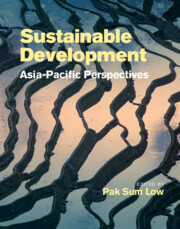Book contents
- Sustainable Development: Asia-Pacific Perspectives
- Sustainable Development: Asia-Pacific Perspectives
- Copyright page
- Dedication
- Contents
- Notes on contributors
- Peer reviewers
- Editor’s note
- Foreword
- Foreword
- Foreword
- Foreword
- Foreword
- Environmental keystones: Remembering Dr Mostafa Kamal Tolba
- Remembering Dr Mostafa Kamal Tolba
- Remembering Dr Mostafa Kamal Tolba
- Acronyms and abbreviations
- SI prefixes
- Unit abbreviations
- Chemical formulae
- Part I Sustainable Development: Theories and Practices
- 1 Asian identities
- 2 On sustainable development
- 3 Sustainability: A scientific dilemma
- 4 Respect and reward: Ecology from the Analects of Confucius
- 5 Sustainable development from an East-West integrative perspective: Eastern culture meets Western complexity theory
- 6 Sustainable urbanism: Measuring long-term architectural merit
- 7 Sustaining wooden architectural heritage
- 8 Green development in China
- 9 Bhutan’s sustainable development initiatives and Gross National Happiness
- 10 A different form of sustainable development in Thailand and Bhutan: Implementation of a sufficiency approach
- 11 The sustainability of food production in Papua New Guinea
- 12 Education for sustainable development: An overview of Asia-Pacific perspectives
- 13 A placemaking framework for the social sustainability of master-planned communities: A case study from Australia
- 14 Poverty, inequity, and environmental degradation: The key issues confronting the environment and sustainable development in Asia
- 15 The challenge of global climate change for international law: An overview
- 16 Sustainable development and climate change negotiations: Perspectives of developing countries
- Part II Sustainable Development: Challenges and Opportunities
- Index
- Endmatter
- References
15 - The challenge of global climate change for international law: An overview
from Part I - Sustainable Development: Theories and Practices
Published online by Cambridge University Press: 23 December 2021
- Sustainable Development: Asia-Pacific Perspectives
- Sustainable Development: Asia-Pacific Perspectives
- Copyright page
- Dedication
- Contents
- Notes on contributors
- Peer reviewers
- Editor’s note
- Foreword
- Foreword
- Foreword
- Foreword
- Foreword
- Environmental keystones: Remembering Dr Mostafa Kamal Tolba
- Remembering Dr Mostafa Kamal Tolba
- Remembering Dr Mostafa Kamal Tolba
- Acronyms and abbreviations
- SI prefixes
- Unit abbreviations
- Chemical formulae
- Part I Sustainable Development: Theories and Practices
- 1 Asian identities
- 2 On sustainable development
- 3 Sustainability: A scientific dilemma
- 4 Respect and reward: Ecology from the Analects of Confucius
- 5 Sustainable development from an East-West integrative perspective: Eastern culture meets Western complexity theory
- 6 Sustainable urbanism: Measuring long-term architectural merit
- 7 Sustaining wooden architectural heritage
- 8 Green development in China
- 9 Bhutan’s sustainable development initiatives and Gross National Happiness
- 10 A different form of sustainable development in Thailand and Bhutan: Implementation of a sufficiency approach
- 11 The sustainability of food production in Papua New Guinea
- 12 Education for sustainable development: An overview of Asia-Pacific perspectives
- 13 A placemaking framework for the social sustainability of master-planned communities: A case study from Australia
- 14 Poverty, inequity, and environmental degradation: The key issues confronting the environment and sustainable development in Asia
- 15 The challenge of global climate change for international law: An overview
- 16 Sustainable development and climate change negotiations: Perspectives of developing countries
- Part II Sustainable Development: Challenges and Opportunities
- Index
- Endmatter
- References
Summary
Global climate change presents an unprecedented challenge for all academic disciplines. Here we analyse the challenge presented to certain basic concepts and principles of international law. While new legal regimes have been created and others adapted to respond to the threats posed by climate change, many foundational aspects of international law remain unchanged in the face of very significant problems. The first problematic area is that of the fundamental notion of statehood, as well as issues of sovereignty. And what of the impact of climate change on human rights and humanitarian intervention, as well as on notions of State responsibility and liability? The Asia-Pacific region is already feeling the impacts of frequent intense weather events (whether one sees these as climate change impacts or not) and has the highest figures for the number of displaced persons by region for natural disasters. Thus, where possible, this chapter will draw from examples in the Asia-Pacific region.
Keywords
- Type
- Chapter
- Information
- Sustainable Development: Asia-Pacific Perspectives , pp. 175 - 198Publisher: Cambridge University PressPrint publication year: 2022

